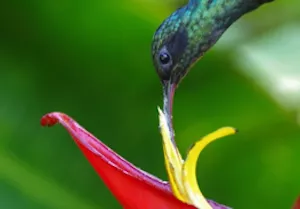
Congratulations to Felipe Torres Vanegas of the Wagner Lab!
Felipe was awarded second place for the best 5 minute talk at the International Congress for Conservation Biology held in Cartagena, Colombia from July 23-27, 2017.
Felipe’s research is on tropical forest fragmentation.
Tropical forest fragmentation is a threat to effective animal-mediated pollination. Habitat fragmentation may decrease the quality of pollen-mediated gene flow, potentially reducing genetic diversity and plant fitness. We explored the effects of tropical forest fragmentation on pollen-mediated gene flow in Heliconia tortuosa – a keystone species that is pollinated by fragmentation-sensitive hummingbirds. We used genetic data to assess whether the effects of forest fragmentation are reducing genetic diversity (seed quality) of pre-dispersal seeds of H. tortuosa populations. We found no evidence that pre-dispersal seeds from small-isolated patches have lower genetic diversity compared to pre-dispersal seeds from large-connected fragments. However, fragmentation does have a negative effect on seed set, and thus on fitness of reproductive H. tortuosa individuals. There may be a time lag in the decay of genetic diversity of pre-dispersal seeds if pollination still occurs between genetically distinct individuals. There is an immediate effect of fragmentation on seed-set, but no instantaneous effect of fragmentation on seed quality.
